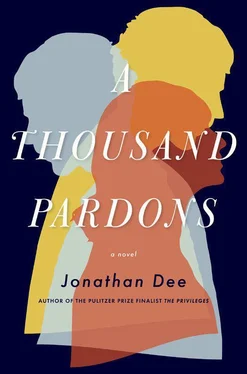“And now she can spend the rest of the evening wondering if I’m going to have her fired.”
“Are you?” Helen asked, idly curious, though it occurred to her that the young woman might even have been a Malloy employee.
“No,” he laughed. “It’s not her fault, really. She has a dark, dark heart.” His eyes seemed to unfocus for a few seconds; then he turned to Helen again and grinned. “I’m Hamilton, by the way.” He put out his hand, and she took it.
“Yes, of course I know who you are,” she said. “But not for the reason you think I do.”
Hamilton squinted. Nearly everyone was seated now, but she could still feel a thousand eyes on them. “Say again?” he said.
“He doesn’t even remember you?” Sara said behind her, uncomfortably close to her ear. “That is priceless.”
“Hello?” said an unfamiliar voice in the air around them; it was the film’s director, who began a short introduction, which after two minutes gave no indication of winding up. Helen, impatient, shifted toward Hamilton and reflexively hunched lower in her seat. Hamilton did the same. “I hate these things,” he whispered. “Always the same. Rituals about nothing. Why is it important that I be here? What does it have to do with me?”
“I can understand why a person would have a few drinks,” Helen said incautiously.
“That gets exaggerated,” Hamilton said, seeming unoffended, “because when I drink, I do stupid things. What did you say your name was again?”
She took a deep breath. “My name is Helen Armstead,” she said. “It used to be Helen Roche. You and I were classmates at St. Catherine’s in Malloy, New York, for eight years.”
She watched his eyes try to resettle on her.
“We lived on Holcomb Street,” she went on in a low voice. His mouth, like hers, was now below the level of the seat back. “My father was the pharmacist at the prison. I was friends with Erin White, whose sister you went out with, or at least that’s what she said.”
She felt terrified, as if she were divulging secrets. Hamilton was doing something with his eyes without even moving them. Sara was nudging her mother in the back to try to get her to sit up straight and stop risking the notice of strangers. There was a tepid rain of applause, and the lights in the theater went down.
“Keep talking,” Hamilton whispered to her. “This is incredible.”
As she did so, her eyes adjusted to the dark and his face came back into focus. “I was at your first communion,” she whispered to him. “I was part of that group that got drunk behind the Little League field after your confirmation. Remember? I was there watching with you when Jerry Merrill flipped his boat on Sylvia Lake. I was there at Sue Coleman’s graduation party when you fell asleep with a cigarette and burned a hole in their couch.”
“Yes,” Hamilton whispered in a tone of awe. “That was me.”
“Sssh!” said someone in the row behind them.
“I sat behind you in Sister Edna’s French class. I knew your mom from when I would help out my mom at the church flea markets on the last Saturday of every month. I knew your little brother who was in the first Gulf War. I can’t remember his name, though.”
“Gilbert,” Hamilton said. “Gil. Oh my God. What else?”
“Would you shut up?” a woman said in the dark above their heads.
Helen didn’t tell him that they had once made out. She didn’t know why. The movie’s opening credits were ending — there was scattered applause for each above-the-line name — and then she had the strange experience of sitting beside Hamilton as he watched himself act on screen. Gradually the sight of his magnified face seemed to bring him out of the trance into which her litany of childhood memories had lowered him. He fidgeted, and chewed at his thumb, until about a half hour into the film he leaned toward Helen and wrapped his fingers gently around her arm.
“I need to hit the bathroom,” he said.
“I hope you don’t feel ambushed,” she whispered. “I didn’t know if I’d get to talk to you at all.”
“Of course not. Hey, I never asked you what you’re even doing here. Do you work for the studio?”
“I work at a PR firm,” she said. “Malloy Worldwide, it’s called, if you can believe it. I think you work with them sometimes.”
“Oh. Sure. Do you have a card or something?”
It was the polite thing you said to someone you knew you were never going to see again. Dispirited, feeling she had said the wrong thing somewhere, she fumbled in her bag for a business card and handed it to him.
“Okay,” he said. “Well, listen.” But then he couldn’t seem to think what else to say. He leaned over and kissed Helen on the cheek, and then, remaining in his crouch, he discreetly exited at the other end of the row.
The movie was about a man who witnesses a killing and has to send his wife and children into hiding while he tries to figure out the murderer’s identity before the murderer figures out his. By the time the lights went up, the on-screen Hamilton had muddied the real but absent one and Helen’s exhilaration had given way to a peculiar, untraceable sadness. She wasn’t particularly surprised that he’d never come back to his seat. She’d upset or offended him somehow. There was a Q and A after the closing credits, but so many people stood and left while it was still going on that Helen took advantage of the general rudeness to leave the theater as well. The street was choked with limos; they had to walk all the way to Madison to find a cab uptown.
Sara texted furiously in the seat beside her as they rode. Helen leaned her forehead against the cool window, staring into the empty boutiques, bright and unpopulated. “So,” Sara said, without looking up. “There it was, right? Your big reunion. Did you reminisce about your great moment in the closet?”
“No,” Helen said. “Nothing like that. I don’t know what I thought would happen. He was a nice man, and I’m glad I talked to him, but in a way I’m sorry I told him who I was at all. People don’t really want to go back to their past. They’d probably rather just get further away from it.” But Sara’s earphones were already back in, so this last thought was delivered to no one.
AFTER A PREMIERE there was always a party. Hamilton tried to remember where it was as he sat on the lid of the toilet in the Ziegfeld bathroom stall. The ordeal of watching his face on screen, like the window to a dead self, was hard to shake, and he was having trouble remembering even the most basic information about himself, much less something as arcane as the location of the party at which he would soon be expected to appear. If indeed he’d ever known it in the first place. That was the kind of thing other people knew for you. And then suddenly it hit him: he jumped up and burst out of the men’s room and stood there on the thick carpet and, looking around to confirm it, realized that his two handlers, those corporate robots attached to him by the studio publicists for the movie, were not there. He’d shaken them when he got up and left in the middle of the show. What do you know, he said to himself with a reflexive pang of satisfaction, I guess they liked the movie.
He found a door marked Fire Exit and said a little prayer before pushing it open, a prayer that was heard, because no alarm went off. Just like that, he was outside the bubble, in the unritualized world of some foul-smelling alley on Fifty-fourth Street. He felt a constructive kind of fear. Industry parties were a Catch-22 because even though they were soul-scalding and hateful, at least you knew what would happen there; you knew everything every smarmy asshole was going to say before he opened his mouth and said it. If he could just remember where the party was, he could go there now and have a few drinks while it was still blissfully asshole-free.
Читать дальше












